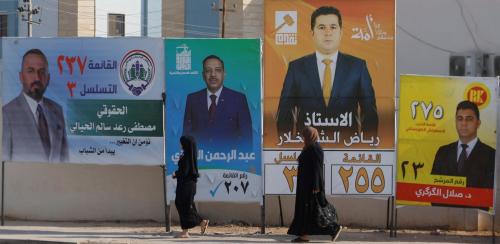In “War without Sacrifice? The Loss of Personal Responsibility” [Winter 2002/03], Cheyney Ryan argues that support for war should include a willingness to die for the cause. He cites an eye-opening poll taken in June of 2002 that showed that although “almost 70 percent of young people agreed with the United States’s right to invade Iraq, an almost equal number would refuse to participate themselves.” It seems that the responsibilities of citizenship lie with others.
Indeed, a concern expressed by many is that the armed forces no longer look like America, that those who serve our country and might die in a war come disproportionately from particular disadvantaged groups. There is some truth to this claim. While reasonably well educated and screened for strong aptitude, members of the armed forces are more likely to be from less affluent blue collar and minority families. During the Persian Gulf War, 23 percent of the troops and 17 percent of those who died in combat were black, according to Darryl Fears of the Washington Post, yet only 12 percent of the general population is black.
Concerned about this unfair distribution of the burdens and costs of war and its possible influence on our willingness to go to war, Congressman Charles Rangel has introduced a bill that would require mandatory military or national service for all young people, ages 18 to 26, with the only exceptions being for extreme hardship, disability, or for the purpose of completing high school. Service would be for two years. Those not needed in the military (as well as conscientious objectors) would be required to contribute to homeland security or to provide other useful community services.
Rangel’s proposal would go a long way toward addressing Ryan’s concerns. Moreover, it is as American as fast food or corn on the cob. From the time of the Civil War until Nixon ended the draft in 1973, conscription was the normal means of protecting U.S. interests at home and abroad. To be sure, the elimination of the draft in 1973 and its replacement by an all-volunteer force has had many benefits. Current enlistees are better educated and smarter than the population at large, and because they have chosen to serve, their morale and readiness are likely to be higher than would be the case with draftees. Still, the end of the draft may have eroded a sense of shared sacrifice and it may even have contributed in some small measure to the public’s willingness to support going to war with Iraq.
But the idea of shared sacrifice should go beyond willingness to fight on the battlefield. It should include willingness to bear other costs—in terms of time, money, and exposure to risk at home or abroad. To take just one example, the government is asking health care workers to get inoculated for smallpox. This carries some risk, and although that risk is small it has generated considerable opposition, suggesting once more that many citizens are ready to support a war against terror, unless it requires them to assume some of the risk (although this issue is complicated by the fact that the government is not offering compensation for those adversely affected by the vaccine). As Congressman Rangel notes, putting a flag on one’s lapel may be patriotic, but it is hardly a burden.
Of all the possible burdens, the one that is easiest to spread widely and fairly—at least in principle—is the financial cost of war. After all, most of us are beyond the age when we might be expected to fight or join the armed forces, and health care workers and other socalled first responders are relatively small groups.
It is for this reason that I have proposed a surtax on incomes to pay for the war on terrorism and any war with Iraq, including the very high costs likely to be associated with a prolonged occupation and reconstruction of that country. At present the amount of these costs is highly uncertain. William Nordhaus of Yale University estimates that the costs of a war with Iraq, including postwar peacekeeping and reconstruction, could vary from $155 billion to $755 billion. The Congressional Budget Office estimates that a three-month heavy ground war followed by troops deployed for five years would cost $272 billion.
The way the surtax would work is that everyone who pays income taxes—personal or corporate—would be asked to pay just a little bit more, say, an extra 5 percent. This means that if your tax bill at the end of the year would normally be $1,000, you would pay an extra $50 for a total of $1,050. Because the surtax is a flat percentage of existing tax liabilities, it would not change the structure of income taxes in any fundamental way. In essence, taxes would be no more nor less progressive than they are now. The surtax rate could be set to produce whatever amount of revenue was needed to fight the war. A 5 percent surtax would yield roughly an extra $70 billion in revenues per year. The surtax could be temporary and could be adjusted as circumstances required. For example, it should not be implemented in the middle of a recession or in the current sluggish economy, when deficit spending can be helpful because it creates jobs and leads to economic recovery. Revenues from the surtax could be earmarked for international and domestic security purposes if desired.
Just such a surtax was imposed during the Vietnam War. In 1967, President Johnson proposed a 10 percent surtax that was enacted in June of 1968. It was levied on both personal and corporate incomes, was a flat percentage of people’s existing tax liabilities, and remained in effect for several years.
Contrast this with the way we are attempting to finance the current war by cutting spending on programs that serve lower- and middle-income Americans and passing along a huge debt to the next generation. These actions, especially the spending curbs, are sometimes justified by the exigencies of war. The point is that they would not be necessary—at least not to the same degree—if we weren’t simultaneously proposing to cut taxes that primarily affect the wealthy and instead were using a surtax either to keep current revenues constant or to raise them.
Whatever the burdens of government, they should be fairly shared, especially during a time of war. If citizens are to be stakeholders in our society, they need to believe in its legitimacy and in the evenhanded allocation of its benefits and burdens. Right now, our democracy is in danger of failing at this essential task.
The Brookings Institution is committed to quality, independence, and impact.
We are supported by a diverse array of funders. In line with our values and policies, each Brookings publication represents the sole views of its author(s).



Commentary
Op-edSharing the Burdens of War
April 1, 2003